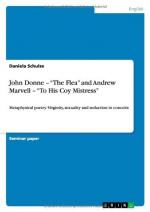|
This section contains 391 words (approx. 1 page at 400 words per page) |

|
The Flea Summary & Study Guide Description
The Flea Summary & Study Guide includes comprehensive information and analysis to help you understand the book. This study guide contains the following sections:
This detailed literature summary also contains Quotes and a Free Quiz on The Flea by John Donne.
The following version of this poem was used to create this guide: Donne, John. "The Flea." John Donne's Poetry. W&W Norton, 2007. Print.
Note that all parenthetical citations refer to the line number in which the quotation appears.
"The Flea" is a poem by John Donne composed of three stanzas of nine lines each. While it was originally published among Donne's other poetry in a posthumous collection in 1633 (Donne died in 1631), it was likely written during the earlier part of Donne's career in the 1590s. John Donne's poetic career is marked by a noticeable divide between his earlier work, when he was a law student at Lincoln's Inn, and his later poetry that he wrote after becoming the Dean of Saint Paul's Cathedral. The poetry written during the first half of his career is characterized by a strong focus on sexuality and eroticism, while his later poetry is characterized by heavily religious imagery and contemplation. This is not to say that Donne's early work is scandalous while his later work is pious; on the contrary, one of the attributes for which Donne is best known is his ability to weave spirituality and eroticism together within individual poems. "The Flea" is consistent with Donne's earlier work, but still showcases Donne's interest in Christian ideology as it explores human sexuality.
Donne is also one of the most famous metaphysical poets in English literature. Metaphysical poets are known for their reliance on conceits, or extended metaphors, along with highly intellectualized verse that engages often with paradox and incongruity. In "The Flea," Donne uses the conceit of the flea to represent physical union while also alluding to spiritual union and marriage. While it is not one of the foremost examples of Donne's prowess in the realm of metaphysical poetry, "The Flea" showcases some of the themes and motifs that Donne would complicate and expand on in his later work.
"The Flea" features a speaker (presumably male), entreating his beloved to consider a flea that has bitten them both. He argues that there is no sense in delaying sexual union between the two of them because their blood has already been mingled together inside the flea. When the woman kills the flea, he uses the fact that she lives on as evidence that sexual union is not a threat to her honor.
Read more from the Study Guide
|
This section contains 391 words (approx. 1 page at 400 words per page) |

|



